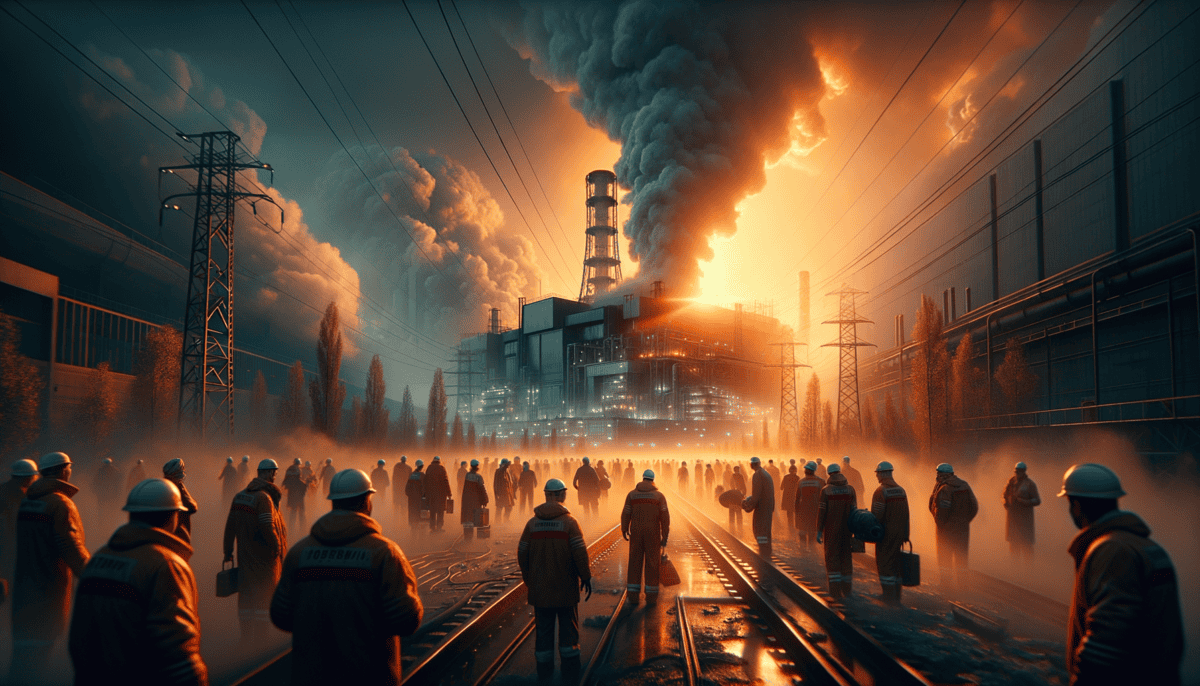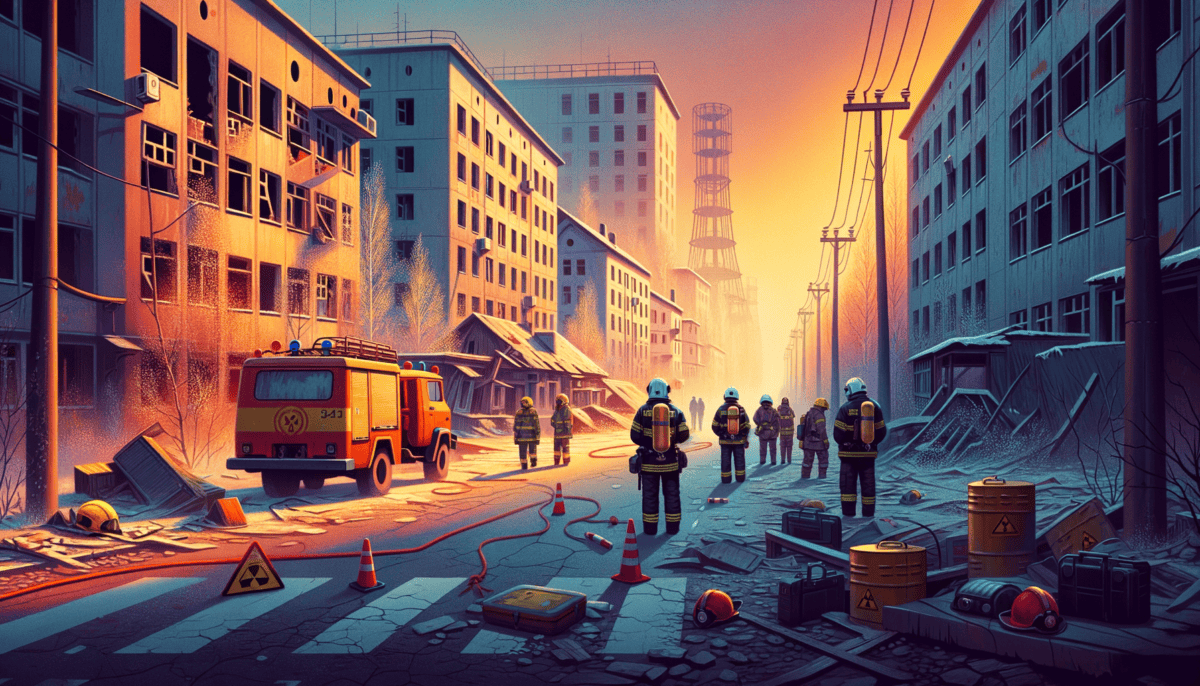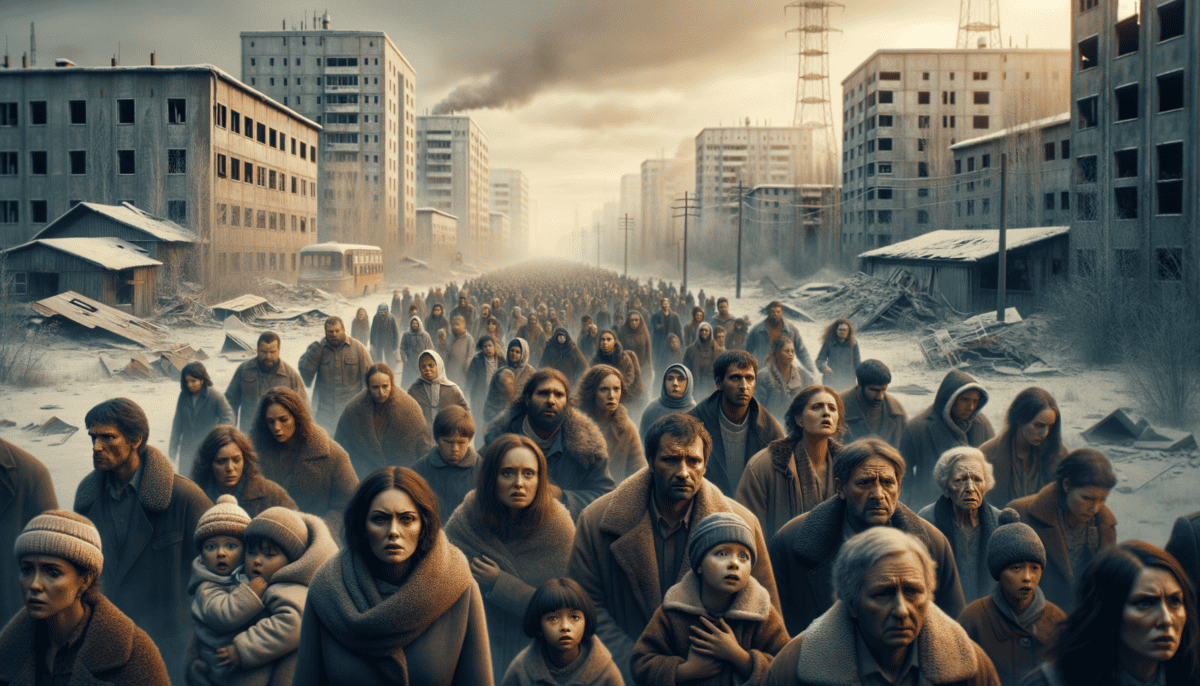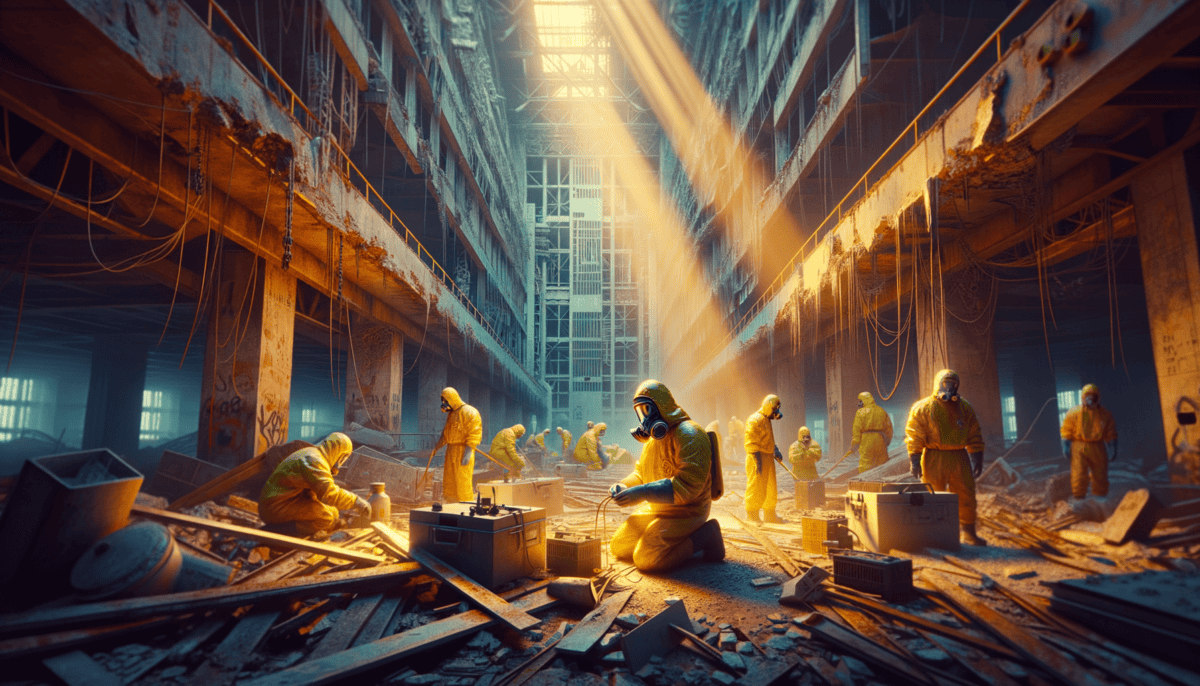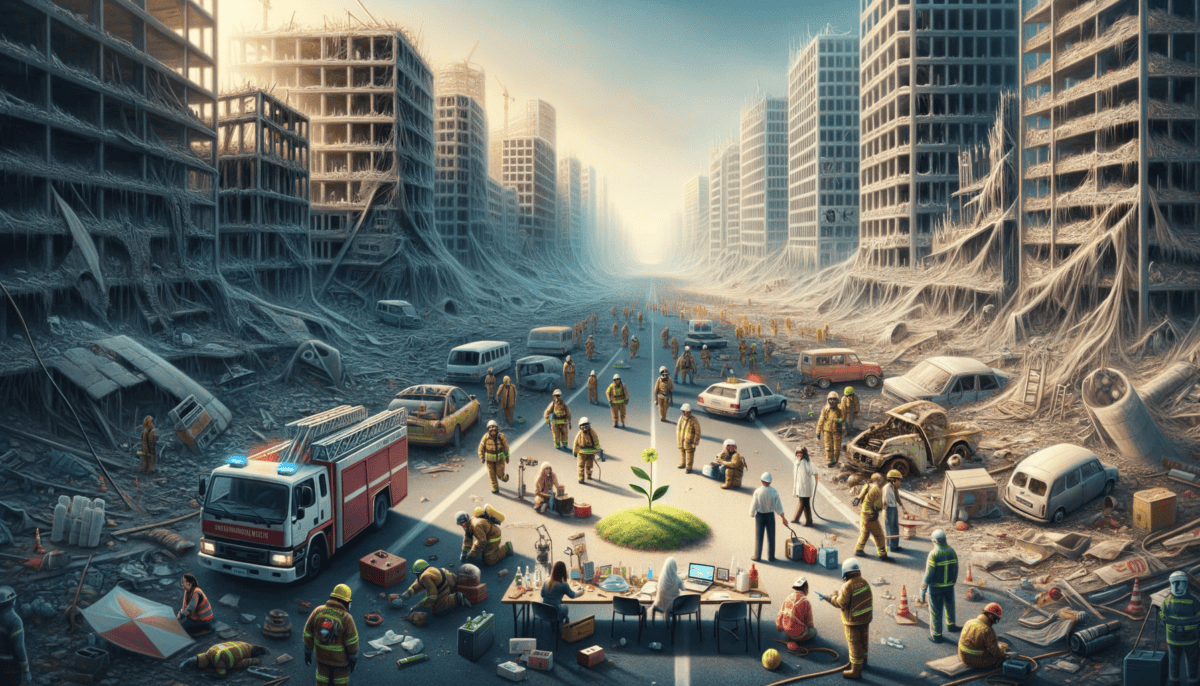Shadows Before the Storm
The morning sun cast long shadows across Pripyat's quiet streets as Viktor Nikolaev adjusted his work uniform. The clock on his kitchen wall showed 5:30 AM – another early start at the Chernobyl Nuclear Power Plant.
"Be safe today," his wife Marina called out, handing him his packed lunch.
"Always am," Viktor smiled, giving her a quick kiss. "Just another day at the plant."
The nuclear power plant stood tall against the Ukrainian sky, its massive cooling towers releasing white clouds of steam into the crisp April air. Viktor had worked here for ten years, and the sight still filled him with pride. This was the crown jewel of Soviet engineering – a place that brought light and power to thousands of homes.
• The plant had four giant reactors
• It powered many nearby cities
• Thousands of people worked there
• It was one of the biggest nuclear plants
Inside the control room, Viktor's colleague Anatoly was already checking the morning readings. The wall of instruments blinked and hummed, showing the reactor's vital signs.
"How's our sleeping giant today?" Viktor asked, settling into his chair.
"Running smooth as always," Anatoly replied, but his face showed slight concern. "Though I noticed some odd readings last night."
The control panels were covered in buttons and switches. Each one had an important job in keeping the reactor safe. But lately, some workers had noticed small problems – nothing big, just little things that didn't seem quite right.
Strange clicking sounds from Reactor 4
Unusual temperature readings
Small equipment failures
Down in Pripyat, life went on as normal. Children played in the parks, and shopkeepers opened their stores. The town was built specially for the power plant workers and their families. Almost everyone there had some connection to the plant.
"Did you hear about the test they want to run?" Anatoly whispered during their lunch break. "Management says it's routine, but…"
Viktor nodded slowly. He knew about the upcoming safety test. Something about it made him uneasy, but he couldn't say why. The plant had run hundreds of tests before – this one shouldn't be any different.
As the afternoon shift began, more workers arrived. The control room buzzed with activity. Engineers checked systems, operators monitored gauges, and supervisors made their rounds.
"Everything by the book," the shift supervisor reminded them. "We're the best nuclear facility in the Soviet Union. Let's keep it that way."
But underneath the normal routine, tiny warning signs continued to appear. A gauge that didn't quite reach its mark. A valve that took longer than usual to close. Small things that would soon add up to something much bigger.
The sun began to set over Pripyat. Workers from the day shift headed home while the night crew took their places. None of them knew that in just a few hours, their world would change forever.
Viktor gathered his things at the end of his shift, glancing one last time at the instruments. Everything looked normal, just like always. But sometimes, the calm before a storm can be the most dangerous time of all.
Walking home through the gathering darkness, he watched the lights come on in apartment windows across Pripyat. The power plant's giant form loomed behind him, its warning lights blinking steadily in the twilight. Tomorrow would bring another day, another shift, another routine. At least, that's what everyone thought.
The Moment Everything Changed
The clock struck midnight in the control room of Reactor 4. Engineer Boris Stolyarchuk watched the instruments with tired eyes. It was time for the safety test everyone had been talking about.
"Ready to begin power reduction," announced Lead Engineer Anatoly Dyatlov, his voice firm and commanding.
The room hummed with nervous energy. Nobody liked working with a nuclear reactor at night, but orders were orders.
• Strange sounds from the reactor
• Unusual temperature readings
• Computer warnings
• Shaking control rods
"Power levels dropping too fast!" Boris called out suddenly. The needles on his gauges were falling like stones.
"Keep going," Dyatlov ordered. "The test must be completed."
The reactor growled deep inside its concrete home. It didn't like being pushed this way. Warning lights started to flash.
"Something's wrong," whispered Leonid, another operator. His hands shook as he pressed buttons trying to fix the problem.
Then it happened. At 1:23 AM, the world exploded.
BOOM!
The floor jumped under their feet. A sound like thunder filled the air. The concrete walls cracked like eggshells.
"Emergency shutdown!" someone screamed. But it was too late.
Outside, firefighter Vasily Ignatenko was just starting his night shift when he saw it – a blue light shooting into the sky from Reactor 4. Then came another explosion, bigger than the first.
"Look!" his partner Pavel shouted. "The roof is on fire!"
The alarm bells started ringing all over the plant. Workers ran from the building, some hurt, others helping their friends.
"It's just a fire," someone said. "The firefighters will handle it."
But this wasn't just any fire. This was something much worse.
In the town of Pripyat, people woke up to bright lights and loud noises. Many went to their windows or walked onto their balconies to watch. They didn't know they were looking at one of the biggest disasters ever.
"Beautiful lights," said a young girl to her mother, pointing at the glowing sky.
"Go back to bed, dear," her mother said. "It's probably just the northern lights."
But it wasn't the northern lights. It was radiation lighting up the air itself.
Back in the destroyed control room, Boris and his coworkers tried to understand what had happened. Their instruments were either broken or showing impossible readings.
"The reactor… it's gone," someone whispered in horror.
The top of Reactor 4 was completely blown off. Where there used to be a solid roof, now there was just a hole with flames and smoke pouring out.
Plant manager Viktor Bryukhanov arrived, his face pale. "Call Moscow," he ordered. "Tell them we've had… an accident."
But this was more than an accident. This was the start of a disaster that would change the world forever. As the first teams of firefighters rushed toward the burning reactor, none of them knew they were running straight into deadly danger.
The night sky glowed an eerie purple-blue over Pripyat. In their homes, people slept peacefully, not knowing that their lives would never be the same. The invisible enemy called radiation was already spreading through the air, carried by the gentle spring breeze. ️
Invisible Danger
The morning sun rose over Pripyat, casting an unusual glow through a thick haze. Firefighter Vasily wiped sweat from his forehead as he fought the strange fires that wouldn’t go out.
“Something’s not right,” he told his friend Pavel. “My skin feels like it’s burning.”
All around them, brave firefighters sprayed water on the flames. But this was no ordinary fire. The water seemed to make things worse, creating more steam that carried dangerous invisible particles into the air.
• It glowed blue instead of red
• Water didn’t put it out
• It made people feel sick quickly
• The air felt hot and strange
At the hospital, Doctor Elena rushed from bed to bed. More workers kept coming in, all with the same symptoms.
“My head hurts,” groaned one firefighter. “And I feel so sick.”
“Rest now,” Elena said softly, but worry clouded her face. She had never seen anything like this before.
Back at the power plant, scientist Valery Legasov arrived from Moscow. His special meter made clicking sounds – lots of them.
“This is worse than we thought,” he said, his face growing pale. “Much worse.”
But outside the plant, children still played in parks. Parents walked to work. Nobody told them to stay inside.
“Look at the pretty dust falling from the sky!” a little boy called out, reaching up to catch what looked like sparkles in the sunlight.
“Don’t touch it!” his mother said, pulling him away. She didn’t know why, but something felt wrong.
In the government offices, phones rang non-stop. Important people in suits argued about what to do.
“We can’t cause panic,” one official said.
“But people need to know they’re in danger!” another argued.
The radiation spread further each hour, carried by wind and rain. Birds flew through the contaminated air. Flowers soaked up the invisible poison through their roots.
Doctor Elena noticed more people getting sick. Even some who weren’t at the fire came to the hospital feeling ill.
“Something bad is in the air,” she wrote in her notebook. “And it’s spreading.”
Valery worked through the night, checking radiation levels. Each reading was worse than the last. He knew they needed help – lots of it.
“Send for more scientists,” he told his team. “And get me Moscow on the phone again.”
The brave firefighters who first fought the blaze were now in hospitals in Moscow. Their skin turned red, and they felt very sick. Vasily held Pavel’s hand as doctors worked to help them.
“We did our job,” Pavel whispered. “We fought the fire.”
“Yes, my friend,” Vasily replied. “But this was an enemy we couldn’t see.”
Finally, after three days, the truth could no longer be hidden. The government announced on TV that there had been an “accident” at Chernobyl.
Helicopters flew over the reactor, dropping sand and special chemicals to try to stop the radiation. The pilots were heroes, flying through dangerous clouds to help.
But the invisible danger had already spread far and wide. Trees turned red and died. Farm animals got sick. And people began to understand that their world had changed forever.
The stars didn’t shine as brightly over Pripyat anymore. They were hidden behind a cloud of invisible danger that would take years to clean up. And still, more brave people came to help, knowing they were risking their lives to save others.
The Great Exodus
The morning of April 27th dawned gray and quiet in Pripyat. Police cars rolled slowly through the streets, their loudspeakers crackling to life.
“Attention citizens! Please pack only essential items. Buses will arrive in one hour. This is a temporary evacuation.”
Marina stood in her apartment, clutching her daughter Natasha’s hand. “What should we take, Mama?” the little girl asked, hugging her favorite teddy bear.
“Just what we need for three days,” Marina replied, trying to keep her voice steady. “That’s what they said – just three days.”
• Important papers
• Some clothes
• A little food
• Personal medicines
• One precious thing
Outside, a long line of buses waited. Yellow machines like giant caterpillars, they stretched down every street. People filed aboard, carrying small bags and worried faces.
“Leave your pets behind,” a soldier called out. “They’ll be safe. We’ll come back for them soon.”
Tears rolled down little Ivan’s cheeks as he said goodbye to his puppy Mishka. “Promise you’ll wait for me,” he whispered, hugging the confused dog one last time.
In the town square, Boris the shopkeeper locked his store doors. “Thirty years I’ve worked here,” he said to no one in particular. “Thirty years…”
Teacher Anna helped her students onto buses, counting heads like she did on school trips. But this was no field trip. Some children cried, others stared silently out windows.
“Remember your science lesson about atoms?” she said brightly, trying to calm them. “Think of this as a big science adventure!”
But her smile didn’t reach her eyes. She knew better.
At the hospital, nurses wheeled sick patients to special buses. Doctor Elena worked quickly, making sure everyone had their medicines.
“We’re moving to a safer place,” she told them gently. “You’ll get better care there.”
The evacuation grew larger with each hour. More towns, more villages. People left homes, farms, and lives they’d built over generations.
News spread across Europe. Other countries offered help. Special doctors came from far away. Reporters tried to get closer but were kept back by soldiers in masks.
“Look, Mama!” Natasha pointed through the bus window. “Our apartment is getting smaller!”
Marina couldn’t answer. Her throat felt tight as she watched her city disappear. In her pocket, she clutched their apartment key – the key to a home they would never see again.
The buses drove through forests and fields, carrying thousands of people to new places. Some went to stay with relatives. Others moved into hastily prepared apartments in Kiev and other cities.
That night, in a strange bed in Kiev, Natasha hugged her teddy bear. “When can we go home?” she asked sleepily.
Marina stroked her daughter’s hair. “Not for a while, sweetheart. But we’re together. That’s what matters.”
Back in Pripyat, empty streets echoed with silence. Doors swung in the wind. Dishes sat unwashed in sinks. Dogs howled for their missing families. Time seemed frozen, like a photograph of a life interrupted.
But far above the abandoned city, brave helicopter pilots still fought the invisible enemy at the reactor. They knew that every family’s sacrifice helped save countless others from harm.
The evacuation of Pripyat became one of the biggest movements of people in peacetime history. A whole city emptied in just hours, leaving behind everything but hope and courage.
Battling the Invisible Enemy
The morning sun cast long shadows over the smoking reactor as helicopter pilot Viktor adjusted his protective mask. Through his goggles, he could see the ghostly ruins of Reactor 4 below.
“Ready for another run,” he radioed to ground control. His helicopter carried heavy bags of sand and boron, meant to smother the burning core.
On the ground, Engineer Dmitri watched through special equipment. “The radiation levels are still climbing,” he said to his team. “We need more protection.”
They worked in short shifts
Wore special suits
Used robots when possible
Risked their lives daily
Never gave up hope
“These suits only give us minutes,” said Maria, a nuclear scientist. She checked her dosimeter, a special device that measured radiation. The numbers made her frown. ⚠️
Teams of workers nicknamed “liquidators” arrived from all over the Soviet Union. Some were miners, others were soldiers, but all became heroes.
“We dig beneath reactor,” said Ivan, a coal miner from Donbas. “Must freeze ground so radiation not reach water.” His strong hands gripped his shovel tightly.
Scientists tried using robots to help clean up, but the radiation was so strong it broke their electronics. Brave people had to do the dangerous work instead.
“Three minutes only!” shouted the supervisor. “Get in, do your job, get out fast!”
German shepherds helped find contaminated areas, wearing special booties to protect their paws. One dog, Max, became famous for saving many lives by warning workers of dangerous spots.
In a nearby command center, Doctor Svetlana treated the liquidators. “You’re all heroes,” she told them, checking for radiation sickness. “But please be careful.”
Engineers worked on plans for a giant cover to put over the reactor. They called it the “sarcophagus.”
“Like ancient Egyptian tombs,” explained Pavel, drawing plans. “But this one will hold something far more dangerous.”
Countries around the world sent help. Special trucks arrived from Germany. Medicine came from France. Scientists flew in from America.
“We’re all in this together,” said Hans, a German engineer. “Radiation knows no borders.”
The workers told jokes to stay brave. They nicknamed the reactor “the Beast” and themselves “the Beast Tamers.”
“Maybe we should sing to it,” laughed Nikolai, a young soldier. But his laughter stopped when his dosimeter started beeping loudly.
Day and night, helicopters dropped their loads on the reactor. The pilots could only fly for short times before the radiation became too dangerous.
“Like fighting an enemy you cannot see,” Viktor said after another flight. His hands shook as he removed his mask.
Finally, after weeks of dangerous work, radiation levels began to drop. The Beast was being tamed, but at a great cost.
“We did it together,” Maria said, looking at her tired team. “But our work isn’t finished.”
The sarcophagus would take months to build. Made of steel and concrete, it would lock away the danger for years to come.
“Our children will remember what happened here,” Dmitri said, watching another sunset over the plant. “They’ll learn to be more careful than we were.”
As night fell, the lights of the work site glowed like stars. Somewhere in the darkness, the liquidators continued their brave fight against an invisible enemy, protecting not just their homeland, but the whole world. ✨
Legacy of Light and Shadow
Thirty years later, Misha stood at the edge of the Exclusion Zone, his grandfather’s liquidator medal in his hand. The old metal caught the sunlight, just like the memories caught in his heart.
“Your grandfather was very brave,” his mother Anna said softly. She had been just a child during the evacuation.
The abandoned city of Pripyat stood silent, nature slowly reclaiming the buildings. Trees grew through old sidewalks. Flowers bloomed in empty apartments.
Wild horses run free
Birds nest in empty buildings
Wolves roam the forests
Plants grow everywhere
Fish swim in clear waters
“Look, Mom!” Misha pointed to a family of deer crossing a distant street. “Life finds a way.”
Scientists in modern protective gear studied the area. They used new tools to check radiation levels, much safer than the old days.
“We learn more every day,” said Dr. Elena, showing Misha her equipment. “Your grandfather’s sacrifice helped make nuclear power safer everywhere.”
The old sarcophagus had been covered by a newer, bigger shield. It gleamed silver in the sun, like a giant metal rainbow protecting the earth.
“Will people ever live here again?” Misha asked, watching a butterfly land on a rusty swing set.
“Not for a very long time,” Anna explained. “But the story of what happened here makes the world safer.”
Around the world, nuclear plants had new safety rules. Workers trained harder. Everyone remembered the lessons of Chernobyl.
“Your grandfather used to say, ‘From darkness comes light,'” Anna smiled, hugging Misha. “He meant that good things can come from hard times.”
Artists painted pictures of the zone. Writers told stories. Musicians sang songs. The world would never forget.
“The liquidators were like superheroes,” Misha said proudly, holding the medal up to the light.
“Yes,” Anna nodded. “Regular people who did extraordinary things to help others.”
New forests grew where old ones died. Animals thrived in the quiet zone. Nature showed its power to heal.
Scientists discovered amazing things about how plants and animals adapt. Each discovery helped protect the environment everywhere.
“Look what I found!” Misha bent down and picked up a small sunflower growing through the cracks in the old pavement.
“Sunflowers help clean the soil,” Dr. Elena explained. “Nature has its own ways of healing.”
The old Ferris wheel stood as a reminder, its empty seats telling stories of lives changed forever. But around it, wildflowers bloomed.
“Your grandfather would be proud,” Anna said, watching Misha carefully document everything in his notebook. “He always hoped future generations would learn from what happened.”
As the sun set over Pripyat, Misha held the medal tightly. The story of Chernobyl wasn’t just about disaster – it was about hope, courage, and the power of people working together to protect each other.
In the distance, a wolf howled. Birds sang in the trees. The exclusion zone had become a different kind of paradise – one where nature and memory danced together in the shadows of history.
“We’ll never forget,” Misha whispered, as the last rays of sun caught the medal’s surface. “And we’ll always keep learning.”
The stars began to appear, the same stars that had watched over the liquidators so many years ago. They twinkled with the light of a thousand stories, a thousand heroes, and a thousand reasons to hope for a better tomorrow. ⭐


